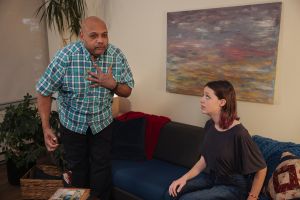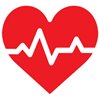In everyday health emergencies, we might feel overwhelmed at first when we need to provide first aid during a heart attack. But being ready to act fast and potentially save a life is super important.
In our 'What To Do If' series, we covered how to respond to a panic attack and stroke. In this article, we'll look at what to do if someone around you appears to be having a heart attack.
The goal is to be ready to act quickly and calmly to provide heart attack first aid. However, remember that taking a first aid course is always the best way to prepare for such scenarios!

What Are the Common Signs of a Heart Attack?
To know what to do for a heart attack, you must first identify the warning signals.
Here are some frequent heart attack symptoms and signs. However, symptoms can vary; for example, not everyone experiences chest pain during a heart attack.
Symptoms and signs of heart attacks:
- Pain, pressure, tightness or heaviness in the chest
- Pain radiating from the chest to the arm(s), shoulders (s), jaw and/or neck
- Dizziness
- Unresponsiveness
- Sweating
- Nausea, vomiting or diarrhea
- Shortness of Breath
- Back or jaw pain

In Case of a Heart Attack: What to do
If you see someone exhibiting these symptoms, it is critical to take prompt action and make sure to:
- Call 9-1-1 or local emergency services.
- Have the person rest quietly.
- Have the person chew either 1 adult dose or 2 low-dose acetylsalicylic acid (ASA) tablets (e.g. Aspirin). Do not repeat the dose.
- Begin CPR if the person is unresponsive and not breathing normally.
- Continue CPR until an automated external defibrillator (AED) arrives, or more advanced care takes over. Learn to perform CPR with this helpful guide or watch this helpful video on how to perform CPR.

Heart Attack vs Cardiac Arrest
Knowing that a heart attack and cardiac arrest are not the same thing is important. However, we need to treat both quickly to lower the risk of major problems.
- A heart attack happens when a blockage restricts blood flow to the heart.
- A cardiac arrest happens when the heart suddenly stops beating and beats too irregularly or too weakly to pump blood effectively.
What Happens When You Get a Heart Attack?
1. Blockage in a Coronary Artery
When you have a heart attack, it's usually because one of your coronary arteries is blocked. This happens when a mix of fat, cholesterol, calcium, and other stuff in your blood builds up and blocks your arteries. This reduces the flow of oxygen-rich blood to your heart and can cause chest pain, also known as angina. The blockage is the leading cause of a heart attack.
2. Reduced Blood Flow to the Heart Muscle
When an artery is blocked, it stops oxygen-rich blood from reaching a part of the heart muscle. This lack of oxygen, called ischemia, makes the heart muscle cells start to die.
3. Heart Muscle Damage
If blood flow is not restored quickly, the heart muscle cells in the affected area start to die, leading to permanent damage. As the heart muscle cells die, scar tissue forms in their place.
4. Physical Symptoms
The most common sign of a heart attack is intense chest pain, heaviness, or discomfort in the center or left side of the chest, according to the International first aid, resuscitation and education guidelines by the IFRC Global First Aid Reference Centre Platform.
People often describe it as pressure, squeezing, or fullness in the chest. Another sign is pain or discomfort in one or both arms, back, shoulders, neck, jaw, or above the belly button. Older adults often get short of breath when resting or doing a little physical activity. Women might feel super tired for no reason, sometimes for days. But you could also have mild symptoms or no symptoms at all and still have a heart attack.
Each year in Canada, an estimated 60,000 cardiac arrests occur outside of hospital - that is one every nine minutes. If you perform CPR and use an AED on a person in cardiac arrest, their chance of survival can double or triple.
Reminders
This article is a useful reference but is not a replacement for proper first aid training. You can sign up for a First Aid course nearby to learn more and prepare yourself. Download the Red Cross First Aid app to easily access life-saving tips and instructions. Another helpful reference is the section "CPR & AED" of the Comprehensive Guide for First Aid & CPR.

